新概念英语第二册第五课
新概念英语第二册第五课

一般过去时的构成
• 概念:过去某个时间里发生的动作或状态;过 去习惯性、经常性的动作、行为。
• 基本构成:主语+动词(包括be)的过去时 • 常用的时间状语:yesterday, last week, an
hour ago, the other day, in 1982等具体时间状 语。 • 【注】不论是否定句还是一般疑问句,只要用 了助动词,原句中的谓语动词的过去时都要还 原成动词原形;主+系+表结构的句子,主语要 和was和were在人称和数上保持一致。
句子中如有过去时的时间副词(如 yesterday, last, week, in 1960)时,不能使用现在完成时,要用过去时 错Tom has written a letter to his parents last night. 对Tom wrote a letter to his parents last night.
• 一般过去时的形式有时并不表示过去的动作 而是只表示说话人的委婉语气。例如: could you tell me your name?
现在完成时的构成
• 概念:过去发生或已经完成的动作对现在造 成的影响或结果,或从过去已经开始,持续 到现在的动作或状态。
• 基本结构:主语+have/has+过去分词 • 否定形式:主语+have/has+not+过去分词 • 常用的时间状语:now,today, tonight, this
新概念英语第二册第五课课后习题答案详解

新概念英语第二册第五课课后习题答案详解新概念英语第二册第五课课后习题答案详解Lesson 5 1.c 根据课文底第3行but Mr. Scott cannot get a telephone for his new garage 判断,只有c. He cant get one 是对的。
是对的。
2. a 根据课文内容,养鸽子的目的是为了传递信息,只有a. he uses them to send messages 与课文的意思相同,而其他3个选择都没有这种含义。
都没有这种含义。
3. d d. his 既可以做所有格形容词又可以做所有格代词既可以做所有格形容词又可以做所有格代词,意思是他的,相当于一个名词,本句只有选d. 句子The garage is his 才符合语法才符合语法. 4. b a. that's so(真的,是那样);c. because(由于,因为)常用来引导原因状语从句; d. for(由于……的缘故,因为)用于提出证据或说明。
本句只有选b. That'swhy(这就是为什么)才可以说明理由,与前一句构成因果关系,而其他3个选择都不符合逻辑。
个选择都不符合逻辑。
5. c 本句是一般过去时的疑问句,句中已经给出助动词did,只需要填一个动词原形即可。
填一个动词原形即可。
只有c. buy 是动词原形,其他是动词原形,其他3个都不是。
个都不是。
6. d 本句是针对距离的远近来提问的。
A. long ago... until 不是说明距离的, long ago 从不和until 连用; b. ong …away 是说明距离的,但应该是long …away from …; c. away …till 中away 不应该和till 连用,不符合习惯用法,从意义上讲不通;只有d. far … from (离……远)是说明距离远近的,符合英语中惯用法,所以选d. 7. a 本句需要选一个介词用在three minutes 之前,表示所用的时之前,表示所用的时间。
新概念英语第二册第五课Percy Buttons

• 4) 用来指某人某物,但不具体说明任何人或任何物。 • A boy came to see you a moment ago . • We need a car now.
• 5)冠词用于某些词组。 • a few 几个 a little 有点
went
给他一餐饭,吃饭又喝酒。 放奶酪进袋,然后就离开。
ClicLkaTtoeTry, peaSlidneeTigitlhebor told me about him. Everybody knows him. His name is Percy Buttons. He calls at every house in the street once a month, and always asks for a meal and a glass of beer.
Click To Type Slide Title
Unit6
What do you want to be in the future?
doctor
nurse
teacher
astronaut
ห้องสมุดไป่ตู้
scientist
singer
actress/actor
director
flight attendant
Click To Type Slide Title
I gave him a meal. He ate the food and drank the beer. Then he put a piece of cheese in his pocket and went away.
ate
新概念英语第二册复习笔记 第五课 单词学习

新概念英语第二册复习笔记第五课单词学习1.pigeon n. 鸽子(信鸽,肉鸽)dove 和平鸽dove of peace和平鸽homing-pigeon信鸽carrier-pigeon 信鸽one’s pigeon: 某人的职责或责任or: one’s business or responsibility某人的职责或责任eg. I don’t care where the money comes from. That’s not my pigeon.我可不关心钱是从哪里来的,那不是我的责任。
2. message n. 信息,口信[C]eg. A pigeon carried the urgent message from the front.一只鸽子从前线捎回紧急信息。
eg. Pigeons carried messages between his two garages.一些鸽子在两个修车铺之间传递信息。
take a message for sb 为…..捎口信leave sb a message 为…..留口信get the message [俚] 明白,理解,领悟(别人的暗示)eg. She said it was getting late, I got the message and left.她说天已经晚了,我立刻明白然后就离开了。
区别:1. message [C]2. information [U] 情报,资料,信息a piece of information 一条信息information technology ( IT ) 信息技术information science 信息科学3. news [U] 消息,新闻,报道a piece of news 一条消息newspaper [C] 报纸3. cover1) n. (书刊的)封皮cover-girl 封面女郎read a book from cover to cover →read a book from beginning to end.把一本书从头读到尾。
新概念英语第二册复习笔记 第五课 课文讲解
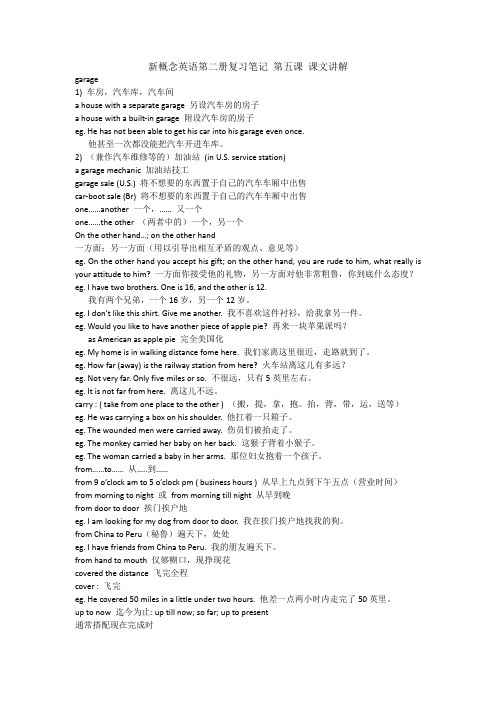
新概念英语第二册复习笔记第五课课文讲解garage1) 车房,汽车库,汽车间a house with a separate garage 另设汽车房的房子a house with a built-in garage 附设汽车房的房子eg. He has not been able to get his car into his garage even once.他甚至一次都没能把汽车开进车库。
2) (兼作汽车维修等的)加油站(in U.S. service station)a garage mechanic 加油站技工garage sale (U.S.) 将不想要的东西置于自己的汽车车厢中出售car-boot sale (Br) 将不想要的东西置于自己的汽车车厢中出售one……another 一个,……又一个one……the other (两者中的)一个,另一个On the other hand…; on the other hand一方面;另一方面(用以引导出相互矛盾的观点、意见等)eg. On the other hand you accept his gift; on the other hand, you are rude to him, what really is your attitude to him? 一方面你接受他的礼物,另一方面对他非常粗鲁,你到底什么态度?eg. I have two brothers. One is 16, and the other is 12.我有两个兄弟,一个16岁,另一个12岁。
eg. I don’t like this shirt. Give me another. 我不喜欢这件衬衫,给我拿另一件。
eg. Would you like to have another piece of apple pie? 再来一块苹果派吗?as American as apple pie 完全美国化eg. My home is in walking distance fome here. 我们家离这里很近,走路就到了。
新概念英语第二册第五课最全讲义

Lesson 5 N o No wrong numbers 无错号之虞【New words and expressions 】生词和短语(7)pigeon n. 鸽子鸽子 message n. 信息信息cover v. 越过越过 distance n. 距离距离 request n. 要求,请求要求,请求 spare part 备件备件service n. 业务,服务业务,服务★pigeon n.鸽子鸽子鸽子 It's not my pigeon.=None of my business.不关我的事。
不关我的事。
★message n. (口头或书面的)信息(口头或书面的)信息Here is a message for you from your sister. an oral ['or ['or əl]口头的,口述的/written message 口信/便条便条leave sb. a message 给……留便条留便条 I'll leave you a message. take a message for sb. 替某人捎口信替某人捎口信Can I take a message for you? 我能替你捎个口信吗? Can you take a message for me? 你能替我捎个口信吗? take a message to sb. 给某人口信给某人口信打电话:Hello!-- May I have a word with Tom ?/May I speak with/to Tom?-- Can you take a message for me?information information [, [,ɪnf ɚ'me ʃən] n.信息(不可数)信息(不可数)信息(不可数) messenger n.送信人,信使, 邮递员邮递员★cover v. 越过;覆盖越过;覆盖① vt. 盖,覆盖盖,覆盖Snow covered the whole village. She covered the child with a coat. 她给孩子盖了件外衣。
新概念英语第二册第五课
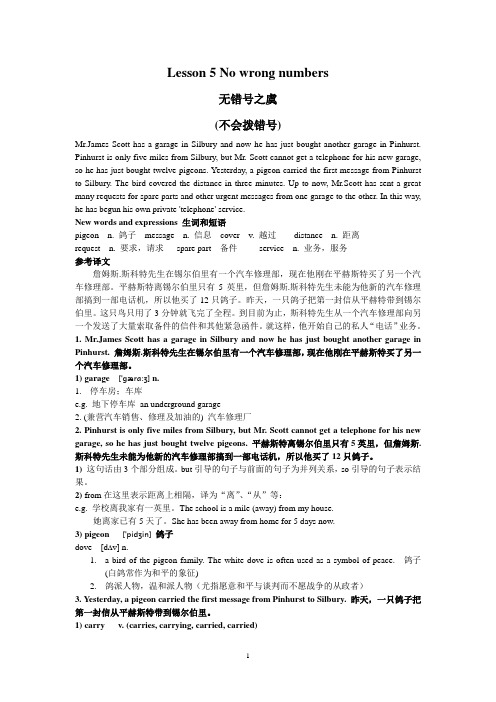
Lesson 5 No wrong numbers无错号之虞(不会拨错号)Mr.James Scott has a garage in Silbury and now he has just bought another garage in Pinhurst. Pinhurst is only five miles from Silbury, but Mr. Scott cannot get a telephone for his new garage, so he has just bought twelve pigeons. Yesterday, a pigeon carried the first message from Pinhurst to Silbury. The bird covered the distance in three minutes. Up to now, Mr.Scott has sent a great many requests for spare parts and other urgent messages from one garage to the other. In this way, he has begun his own private 'telephone' service.New words and expressions 生词和短语pigeon n. 鸽子message n. 信息cover v. 越过distance n. 距离request n. 要求,请求spare part 备件service n. 业务,服务参考译文詹姆斯.斯科特先生在锡尔伯里有一个汽车修理部,现在他刚在平赫斯特买了另一个汽车修理部。
平赫斯特离锡尔伯里只有5英里,但詹姆斯.斯科特先生未能为他新的汽车修理部搞到一部电话机,所以他买了12只鸽子。
昨天,一只鸽子把第一封信从平赫特带到锡尔伯里。
裕兴新概念英语第二册笔记---第五课
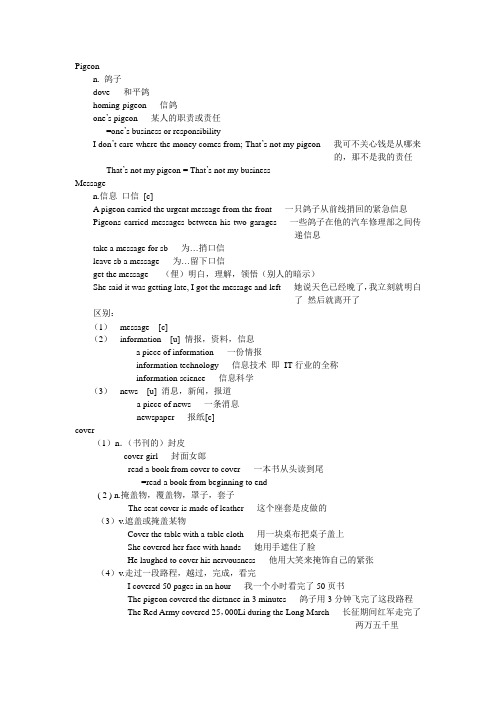
Pigeonn. 鸽子dove 和平鸽homing-pigeon 信鸽one’s pigeon 某人的职责或责任=one’s business or responsibilityI don’t care where the money comes from; That’s not my pigeon 我可不关心钱是从哪来的,那不是我的责任That’s not my pigeon = That’s not my businessMessagen.信息口信[c]A pigeon carried the urgent message from the front 一只鸽子从前线捎回的紧急信息Pigeons carried messages between his two garages 一些鸽子在他的汽车修理部之间传递信息take a message for sb 为…捎口信leave sb a message 为…留下口信get the message (俚)明白,理解,领悟(别人的暗示)She said it was getting late, I got the message and left 她说天色已经晚了,我立刻就明白了然后就离开了区别:(1)message [c](2)information [u] 情报,资料,信息a piece of information 一份情报information technology 信息技术即IT行业的全称information science 信息科学(3)news [u] 消息,新闻,报道a piece of news 一条消息newspaper 报纸[c]cover(1)n.(书刊的)封皮cover-girl 封面女郎read a book from cover to cover 一本书从头读到尾=read a book from beginning to end( 2 ) n.掩盖物,覆盖物,罩子,套子The seat cover is made of leather 这个座套是皮做的(3)v.遮盖或掩盖某物Cover the table with a table cloth 用一块桌布把桌子盖上She covered her face with hands 她用手遮住了脸He laughed to cover his nervousness 他用大笑来掩饰自己的紧张(4)v.走过一段路程,越过,完成,看完I covered 50 pages in an hour 我一个小时看完了50页书The pigeon covered the distance in 3 minutes 鸽子用3分钟飞完了这段路程The Red Army covered 25,000Li during the Long March 长征期间红军走完了两万五千里Distancen.距离,行距It’s a great distance from here. 那里离着很远It’s some distance from here 那里离这相当远It’s no distance from here 那里离这不远The church is within walking distance from my home 那个教堂离我家不远走路就能到了keep one’s distance from others 保持距离A British always keeps his distance from others 英国人总是和别人保持一定距离in the distance :far away 远方,远处,在远方distant adj.远隔的,遥远的或远亲的a distant village 一个遥远的小村庄=a remote villageRequestn./v.要求请求1)n. request for sth 对…的要求,请求make repeated requests for help 一再发出求救的要求at sb’s request 应…的请求at sb’s invitation 应…的邀请2)v. request sth from sb 向…要=request sth of sbThe boy requested pocket money from his parents 这个男孩向父母要零花钱request sb to do sth 要求…做(formal 多用于被动式)want sb to do sth 想让…做ask sb to do sth 让…做Dear Sir,I have been requested to inform you that…敬启者,兹通知阁下…Spare1)adj. 多余的,剩余的,备用的spare parts 备件Do you have a spare wheel in your car?你车上有没有备用轮胎We have a spare room in the flat 我们公寓里有个备用的房间I have no spare money to lend you 我没有闲钱借给你2)adj. 空闲的,未占用的I have no spare time this month 这个月我没有空3)v. 饶恕,宽恕spare sb (let sb off)Spare me,please,I won’t do it again 求求你饶过我吧,我再也不敢了4)v. (为某人某事)提供(时间,金钱),拨出,分出Can you spare me a few minutes?你能借给我几分钟时间吗?I have no time to spare now 我现在没有任何空闲时间形容词spare和动词to spare的区别:I cannot spare the time. 我花不起时间I have no time to spare 我没有时间I cannot buy spare parts for this car 我买不起这辆车的备件There is a spare room in this house 在这栋房子里有一间空房Caligula spared the slave’s life 卡里格勒饶恕了那个奴隶的命Servicen. 业务服务service center 服务中心banking and insurance service 银行及保险业务telephone service 电话业务his service to the country 他为祖国做出的贡献bear’s service 帮倒忙serve v. 为谁服务serve sb 为…服务serve the people 为人民服务serve the customers 为顾客服务garage1)车房,汽车库,汽车间a house with a separate garage 另设汽车房的房子a house with a built garage 附设汽车房的房子2)(兼做汽车维修等的)加油站a garage mechanic 加油站技术工人one … another 一个,…又一个one … the other (两者中的)一个,另一个On the one hand…; on the other hand 一方面;另一方面(用以引导出相互矛盾的观点,意见等)On the one hand you accept his gift ; on the other hand, you are rude to him. What really is your attitude to him? 一方面你接受他的礼物,另一方面你对他又那么粗鲁,你到底什么态度啊?I have two brothers. One is 16,and the other is 12.我有两个弟弟,一个16岁一个12岁I don’t like this shirt. Give me another 我不喜欢这件衬衫,请给我另外一件Would you like to have another piece of apple pie? 再来一块苹果派吗?Carry(take from one place to the other)搬提拿抱抬背运送等He was carrying a box on his shoulder 他扛着一个箱子from … to …从…到…from 9 o’clock am to 5 o’clock pm 从早9点到晚5点from morning to night 从早到晚=from morning till nightfrom door to door 挨门挨户的I am looking for my dog from door to door 我在挨门挨户的找我的狗from China to Peru(秘鲁)遍天下处处I have friends from China to Peru 我的朋友遍天下from hand to mouth 仅够糊口,现挣现花up to now:up till nowso farup to present通常搭配现在完成时up to/till 到…为止,知道…Up to the fourth night we had experienced no bad weather 一直到第四个晚上我也没有遇到恶劣的天气It’s up to you 由你决定(口)a great many + (pl.) 谓语动词复数a number of + (pl.)谓语动词复数many a + 单数可数n. 谓语动词单数Many a student is fond of films 许多学生都喜欢电影Otherpron.1)(做定语)另外的,别的,其他的I’m busy now;ask me about it some other time 我现在忙着呢,你其他时间再来问我吧There are other ways of doing it 还有其他方法做这件事情2)(做主语或宾语)另一个,另外(几个);另外的人或物We got home by 6 o’clock,but the others didn’t get back until about 8 o’clock我们六点钟就到家了,其他人8点钟才回来Some like milk chocolate,others prefer plain chocolate有些人喜欢牛奶巧克力,另一些人喜欢纯巧克力What I say goes in at one ear and out at the other我所说的话一只耳朵进一只耳朵出Urgentadj. 紧急的,迫切的an urgent message 紧急情况an urgent case 紧急情况an urgent cry 紧急呼救urgency n. [u] 紧急迫切This is a problem of great urgency 这是一个非常紧急的问题Own1)v. 拥有have ;possess2)adj. 自己的,个人的I dream of owning my own house 我梦想着有自己的房子I saw it with my own eyes 我亲眼看到的Our children have grown up and have children of their own我们的孩子已经长大了,而且还有了他们自己的孩子Mind your own business 管好你自己的事in the wayPlease move this chair. It’s in the way 请挪一下这把椅子,它把路挡着了Do your work in the way I have shown you 用我教你地方法来做这工作On the wayOn the way to the station,I bought some chocolate在去车站的路上我买了一些巧克力on the way home 在回家的路上on the way to school 在去上学的路上on the way to work 在上班的路上in this way用这种方式He saves old envelopes. In this way,he has collected a great many stamps他收集旧的信封,用这种方式他收集了大量的邮票in that way用那种方式by the way顺便问一句By the way,have you seen Harry recently?顺便问一下,你最近见过哈利吗?In a way在某种意义上In a way,it is an important book 在某种意义上来讲,这是一本很重要的书get one’s own way随心所欲。
新概念英语第二册笔记(顶级打印版)
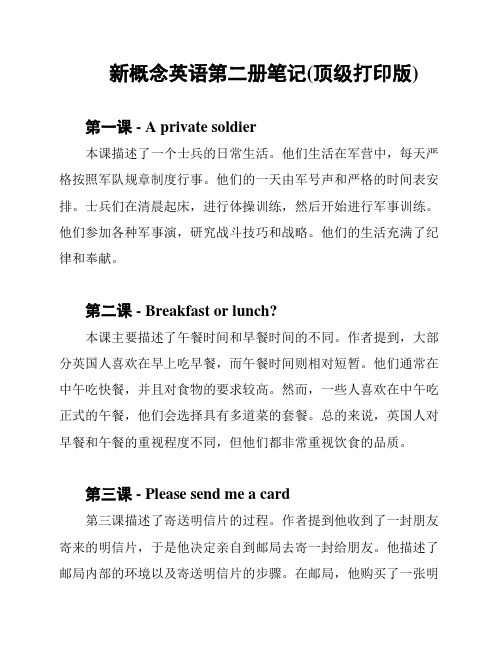
新概念英语第二册笔记(顶级打印版)第一课 - A private soldier本课描述了一个士兵的日常生活。
他们生活在军营中,每天严格按照军队规章制度行事。
他们的一天由军号声和严格的时间表安排。
士兵们在清晨起床,进行体操训练,然后开始进行军事训练。
他们参加各种军事演,研究战斗技巧和战略。
他们的生活充满了纪律和奉献。
第二课 - Breakfast or lunch?本课主要描述了午餐时间和早餐时间的不同。
作者提到,大部分英国人喜欢在早上吃早餐,而午餐时间则相对短暂。
他们通常在中午吃快餐,并且对食物的要求较高。
然而,一些人喜欢在中午吃正式的午餐,他们会选择具有多道菜的套餐。
总的来说,英国人对早餐和午餐的重视程度不同,但他们都非常重视饮食的品质。
第三课 - Please send me a card第三课描述了寄送明信片的过程。
作者提到他收到了一封朋友寄来的明信片,于是他决定亲自到邮局去寄一封给朋友。
他描述了邮局内部的环境以及寄送明信片的步骤。
在邮局,他购买了一张明信片,写下了一些祝福的话语,并将明信片投入邮箱。
通过这个故事,我们可以了解到寄信的简单过程以及邮局的服务。
第四课 - An exciting trip本课描述了作者在乘坐飞机的旅行中的经历。
他搭乘飞机前往某个异国他乡。
他说他对飞行感到非常兴奋,飞机从地面升起,他逐渐能看到云朵和地球的景色。
作者感受到飞行的愉悦和独特之处。
尽管飞行中存在些许颠簸,但作者还是对这次旅行的刺激和兴奋充满期待。
第五课 - She's got a bike本课描述了一个女孩拥有自行车的故事。
女孩对自行车非常珍惜,并且乐于与别人分享。
她会骑着自行车到处游玩,与朋友一起度过美好的时光。
女孩非常喜欢自行车,她将它视为一种自由的方式。
做父母的则非常认同自行车的积极影响,并且对女孩骑行的能力感到骄傲。
第六课 - What's in your hand?本课描述了一个妇女在手中拿着一个刚刚购买的物品。
[全]新概念英语单词全套详解第二册5课
![[全]新概念英语单词全套详解第二册5课](https://img.taocdn.com/s3/m/984104f833687e21af45a9cb.png)
新概念英语单词全套详解第二册5课《新概念英语》第二册Lesson 5词汇表(标★的为核心必备词汇)1. pigeon [pidʒin] n.鸽子2. ★message ['mesidʒ]n.信息3. ★over ['əuvə] v.越过4. ★distance ['distəns] n.距离5. ★request [ri'kwest] n.要求,请求6. ★spare [speə] 备件7. ★service ['sə:vis] n.业务,服务《新概念英语》第二册Lesson 5通览课文,掌握大意。
了解生词,目标明确。
1. pigeon [pidʒin] n.鸽子1.pigeon n. 鸽子1 [可数C or 不可数名词U] a large usually grey bird, which is often seen in towns sitting on buildings in large groups, and is sometimes eaten as food2. pigeon[C] 信鸽a pigeon kept as a pet in order to take part in flying competitions①racing/homing pigeons 赛鸽/信鸽②be not your pigeon UK 习惯用语old-fashioned, not be your responsibility不是(你)的责任③That's not my pigeon .这不归我管。
2. message ['mesidʒ] n.信息[C]INFORMATION⑴message信息;消息;口信a short piece of information that you give to a person when you cannot speak to them directly①If I'm not there when you phone, leave a message.如果你打电话时我不在,就留个口信。
新概念英语第二册第5课NCE_2_Lesson_5lyf

过去一般时和现在完成时区别: 3)现在完成时可表示持续到现在的动作或状态,动词一般是延 续性的,如live, teach, learn, work, study, know. 过去时常用的非持续性动词有come, go, leave, start, die, finish, become, get married等。 e.g. I saw this film yesterday. (强调看的动作发生过了。) I have seen this film. (强调对现在的影响,电影的内容已经知道了。)
• • • •
I _______ to him last month. write I ______ this car last year. buy He ______ to see me this morning. come I _____ him ten minutes ago. see
• The bird covered the distance in three minutes. • cover: 完成一段行程。 • They have covered 60 miles since yesterday morning. • I covered the distance in 5 minutes by car. • I covered the distance in 20 minutes on foot.
Language points
• Pinhurst is only five miles from Silbury.
• The bank is about five minutes’ walk away. • 我家离学校七公里。 • 我家开车到学校十五分钟。
• Yesterday, a pigeon carried the first message from Pinhurst to Silbury. carry a message 传递信息。 (carry:运送,传递) Can you carry this package to the post office for me?
新概念英语二 第五课作文仿写

新概念英语二第五课作文仿写In the fifth lesson of New Concept English 2, the topic is about travel. I will provide a sample answer for the writing task in this lesson.Question: Write a composition of about 120 words on "A Journey by Air".Answer:Traveling by air is a convenient and fast way to reach distant destinations. Last summer, I had the opportunity to take a journey by air to visit my relatives in another country. The experience was both exciting and memorable.Before the flight, I felt a mixture of excitement and nervousness. The airport was bustling with people, and the process of checking in and going through security was a bit overwhelming. However, once I boarded the plane and settled into my seat, I felt a sense of calm as the aircraft took off smoothly.During the flight, I enjoyed looking out of the window and seeing the world from above. The view of the clouds, cities, and landscapes below was breathtaking. The in-flight entertainment and meals also made the journey more enjoyable.Upon landing, I was greeted by my relatives at the airport, and we spent a wonderful time together exploring new places and creating lasting memories.中文回答:乘坐飞机是一种方便快捷的方式到达遥远的目的地。
新概念英语第二册第5课

Up to now, he has not been very hard-working.
a great many(+可数名词复数) 许多…… a great many可以做形容词短语: A great many trees were destroyed in the storm. 也可作代词短语: He has read a great many of the books in this room. a great number of(+可数名词复数) 许多…… urgent adj. 紧急的 something urgent 紧急的事情
He looked at the girl from head to foot.
1
The news spread from house to house. 家家户户都得知了这条消息。
2
from…to…表示从一个地方到另一个地方
Up to now, Mr.Scott has sent a great many requests for spare parts and other urgent messages from one garage to the other.
2、Pinhurst is only five miles from Silbury, but Mr. Scott cannot get a telephone for his new garage, so he has just bought twelve pigeons. 介词from在这里表示距离上相隔,作“距……”、“离……”讲,常与away连用 It is far (away) from here. Bus stop is only one mile from school/here. Bus stop is only one mile (away). She has been away from home for 5 days now. How far...? 多远(对距离提问) How far(away) is the bus stop? How far is your home(from here)? My home is ten miles away from here.
逐句精讲新概念英语第二册第五课 无错号之虞

逐句精讲新概念英语第二册:第五课无错号之虞Lesson 5 No wrong numbers课文内容:Mr James Scott has a garage in Silbury and now he has just bought another garage in Pinhurst. Pinhurst is only five miles from Silbury, but Mr Scott cannot get a telephone for his new garage, so he hasjust bought twelve pigeons. Yesterday, a pigeon carried the first message from Pinhurst to Silbury. The bird covered the distance in three minutes. Up to now, Mr Scott has sent a great many requests for spare parts and other urgent messages from one garage to the other. In this way, he has begun his own private telephone service.本文语法:现在完成时现在完成时结构:has/have+done(动词的过去分词形式)语法归纳:指过去已经发生的动作,可能已经完成,但对现在仍有影响,也可能还将延续,强调对现在的影响和结果。
在现在完成时句子中常常存在一些重要的时间标志词,这些标志词分别是:just刚刚,recently最近,already已经,in the past过去,so far到目前为止,yet仍然,ever曾经,up till now到目前为止,since自从……以来,等等。
逐句精讲:1. Mr James Scott has a garage in Silbury and now he has just bought another garage in Pinhurst.詹姆斯.斯科特先生在锡尔伯里有一个汽车修理部,现在他刚在平赫斯特买下了另一个修理部。
新概念英语第二册5课

新概念英语第二册5课
新概念英语第二册第5课主要是讲述了一位名叫约翰·斯密斯
的年轻人在伦敦的一家旅馆工作。
在这一课中,约翰·斯密斯在旅
馆工作期间,遇到了一位住客,他是一位来自美国的商人。
这位商
人在约翰·斯密斯的帮助下,解决了一些问题,并对他的服务表示
了满意。
在这一课中,学生将学习到一些关于旅馆服务的常用英语表达,比如如何接待客人、如何解决客人的问题、如何询问客人的需求等等。
这些内容对于学习英语的学生来说非常实用,可以帮助他们提
高日常英语口语表达能力。
此外,这一课还涉及到一些关于文化差异的内容,比如英国人
和美国人在礼貌用语和交流方式上的一些差异。
通过学习这些内容,学生可以更好地理解不同国家和地区的文化差异,增进跨文化交流
的能力。
总的来说,新概念英语第二册第5课通过约翰·斯密斯在旅馆
工作的故事,帮助学生学习了一些实用的英语口语表达,并且让他
们了解了一些关于文化差异的知识。
这些内容对于学生的英语学习和跨文化交流能力的提高都具有积极的意义。
新概念2第五课习题答案

新概念2第五课习题答案新概念2第五课习题答案新概念英语是一套广泛使用的英语教材,其中的习题是学习者提高英语能力的重要组成部分。
在新概念2第五课中,习题的难度逐渐增加,涵盖了课文中的重点内容。
本文将为大家提供新概念2第五课习题的答案,帮助大家检验自己的学习成果。
第一题:翻译下列句子1. 他们正在开会。
答案:They are having a meeting.2. 她正在洗衣服。
答案:She is washing the clothes.3. 我正在读一本好书。
答案:I am reading a good book.第二题:选择合适的单词填空1. The _________ is very hot today. We should stay indoors.答案:weather2. I have a _________ headache. I need to lie down.答案:terrible3. The _________ is very beautiful. Let's take a walk.答案:garden4. The _________ is very loud. I cannot concentrate on my work.答案:noise5. The _________ is very delicious. Can I have another piece? 答案:cake第三题:根据课文内容回答问题1. What is the weather like today?答案:It is very hot today.2. Why did the writer close the window?答案:Because the noise from the garden was too loud. 3. What did the writer do after closing the window?答案:The writer went to the garden.4. What did the people in the garden do?答案:They were having a meeting.第四题:将下列动词变为进行时态1. play答案:playing2. swim答案:swimming3. read答案:reading4. eat答案:eating5. write答案:writing第五题:将下列句子变为否定句1. She is reading a book.答案:She is not reading a book.2. They are playing basketball.答案:They are not playing basketball.3. He is watching TV.答案:He is not watching TV.4. We are eating dinner.答案:We are not eating dinner.5. I am going to the park.答案:I am not going to the park.通过完成以上习题,我们可以对自己在学习新概念2第五课中的掌握程度有一个初步的了解。
新概念英语第二册第五课
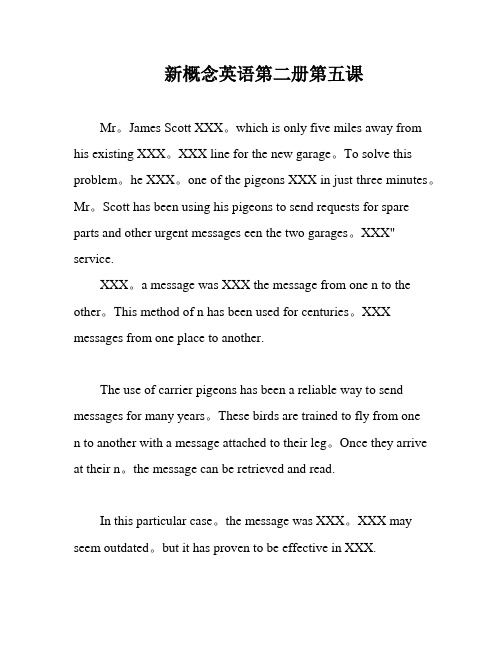
新概念英语第二册第五课Mr。
James Scott XXX。
which is only five miles away from his existing XXX。
XXX line for the new garage。
To solve this problem。
he XXX。
one of the pigeons XXX in just three minutes。
Mr。
Scott has been using his pigeons to send requests for spare parts and other urgent messages een the two garages。
XXX" service.XXX。
a message was XXX the message from one n to the other。
This method of n has been used for centuries。
XXX messages from one place to another.The use of carrier pigeons has been a reliable way to send messages for many years。
These birds are trained to fly from onen to another with a message attached to their leg。
Once they arrive at their n。
the message can be retrieved and read.In this particular case。
the message was XXX。
XXX may seem outdated。
but it has proven to be effective in XXX.Overall。
(完整word版)新概念英语第二册第五课

Lesson 5 No wrong numbers无错号之虞(不会拨错号)Mr.James Scott has a garage in Silbury and now he has just bought another garage in Pinhurst。
Pinhurst is only five miles from Silbury, but Mr. Scott cannot get a telephone for his new garage,so he has just bought twelve pigeons。
Yesterday, a pigeon carried the first message from Pinhurst to Silbury. The bird covered the distance in three minutes。
Up to now, Mr。
Scott has sent a great many requests for spare parts and other urgent messages from one garage to the other. In this way,he has begun his own private 'telephone’ service.New words and expressions 生词和短语pigeon n. 鸽子 message n. 信息 cover v. 越过 distance n。
距离request n. 要求,请求 spare part 备件 service n. 业务,服务参考译文詹姆斯.斯科特先生在锡尔伯里有一个汽车修理部,现在他刚在平赫斯特买了另一个汽车修理部。
平赫斯特离锡尔伯里只有5英里,但詹姆斯.斯科特先生未能为他新的汽车修理部搞到一部电话机,所以他买了12只鸽子。
昨天,一只鸽子把第一封信从平赫特带到锡尔伯里.这只鸟只用了3分钟就飞完了全程.到目前为止,斯科特先生从一个汽车修理部向另一个发送了大量索取备件的信件和其他紧急函件。
新概念英语第二册第五课课文详解

新概念英语第二册第五课课文详解新概念英语二册第五课讲解一、生词和短语1、pigeon n. 鸽子It's not my pigeon. 这不是我的过错=None of my busness.2、message n. 信息information...不可数leave sb. a message:给...留便条I'll leave you a message.take a message for sb:替...捎口信Can I take a message for you?Can you take a message for me?3、cover v. 越过cover:覆盖cover+距离:越过cover the distancedistance n. 距离distant:(a)远距离的importance:(n.)重要important:(a.)重要的different:(a.) 不同的 difference:(n.)不同keep distance:保持距离4、request n. 要求,请求request for:对...有请求,有需求I have a request for the cake.request sb.to do sth...要求某人做..=ask sb.to do sth.require sb.to do sth.you are required/asked to do...5、service n. 业务,服务serve:(v.) 服务,接待service:(n.)服务,业务I am glad to be at your service. 我很乐意为您效劳.--Thank you.--You are welcome./Not at all./That's (all)right./(It's) My pleasure./That's ok.--Thank you for your listening.-No thanks.二、词汇辨析:1、other 能够做形容词,表示其他的,比如other people其他的人。
- 1、下载文档前请自行甄别文档内容的完整性,平台不提供额外的编辑、内容补充、找答案等附加服务。
- 2、"仅部分预览"的文档,不可在线预览部分如存在完整性等问题,可反馈申请退款(可完整预览的文档不适用该条件!)。
- 3、如文档侵犯您的权益,请联系客服反馈,我们会尽快为您处理(人工客服工作时间:9:00-18:30)。
Lesson 5 No wrong numbers无错号之虞(不会拨错号)Mr.James Scott has a garage in Silbury and now he has just bought another garage in Pinhurst. Pinhurst is only five miles from Silbury, but Mr. Scott cannot get a telephone for his new garage, so he has just bought twelve pigeons. Yesterday, a pigeon carried the first message from Pinhurst to Silbury. The bird covered the distance in three minutes. Up to now, Mr.Scott has sent a great many requests for spare parts and other urgent messages from one garage to the other. In this way, he has begun his own private 'telephone' service.New words and expressions 生词和短语pigeon n. 鸽子message n. 信息cover v. 越过distance n. 距离request n. 要求,请求spare part 备件service n. 业务,服务参考译文詹姆斯.斯科特先生在锡尔伯里有一个汽车修理部,现在他刚在平赫斯特买了另一个汽车修理部。
平赫斯特离锡尔伯里只有5英里,但詹姆斯.斯科特先生未能为他新的汽车修理部搞到一部电话机,所以他买了12只鸽子。
昨天,一只鸽子把第一封信从平赫特带到锡尔伯里。
这只鸟只用了3分钟就飞完了全程。
到目前为止,斯科特先生从一个汽车修理部向另一个发送了大量索取备件的信件和其他紧急函件。
就这样,他开始自己的私人“电话”业务。
1.Mr.James Scott has a garage in Silbury and now he has just bought another garage in Pinhurst. 詹姆斯.斯科特先生在锡尔伯里有一个汽车修理部,现在他刚在平赫斯特买了另一个汽车修理部。
1) garage ['gærɑ:ʒ] n.1.停车房;车库e.g. 地下停车库an underground garage2. (兼营汽车销售、修理及加油的) 汽车修理厂2.Pinhurst is only five miles from Silbury, but Mr. Scott cannot get a telephone for his new garage, so he has just bought twelve pigeons. 平赫斯特离锡尔伯里只有5英里,但詹姆斯.斯科特先生未能为他新的汽车修理部搞到一部电话机,所以他买了12只鸽子。
1) 这句话由3个部分组成。
but引导的句子与前面的句子为并列关系,so引导的句子表示结果。
2) from在这里表示距离上相隔,译为“离”、“从”等:e.g. 学校离我家有一英里。
The school is a mile (away) from my house.她离家已有5天了。
She has been away from home for 5 days now.3)pigeon ['pidʒin]鸽子dove [dʌv] n.1. a bird of the pigeon family. The white dove is often used as a symbol of peace. 鸽子(白鸽常作为和平的象征)2.鸽派人物,温和派人物(尤指愿意和平与谈判而不愿战争的从政者)3.Yesterday, a pigeon carried the first message from Pinhurst to Silbury. 昨天,一只鸽子把第一封信从平赫斯特带到锡尔伯里。
1) carry v. (carries, carrying, carried, carried)1.[vn] 拿;提;搬;扛;背;抱;运送e.g. (1) 他提着一只手提箱。
He was carrying a suitcase.(2) 她怀里抱着她的宝宝。
She carried her baby in her arms.2. [vn] 携带,佩带e.g. 我身上从不多带钱。
I never carry much money on me.3. [vn] 承担(责任);承受(结果)e.g. 他维持着这个部门的工作。
He is carrying the department. (=it is only working because of his efforts.)carry sth. out1.履行;实施;执行;落实e.g. (1) 履行承诺to carry out a promise(2) 实施计划to carry out a plan(3) 执行命令to carry out an order2. to do and complete a task 完成(任务)e.g. 进行调查to carry out an investigation2) from…to…表示从一个地方到另一个地方。
如下文中的from one garage to the other.这个短语中顺序比较重要,不能搞错方向:e.g. 他从北京坐飞机去纽约。
He flew from Beijing to New York.他把这姑娘从头到脚打量了一下。
He looked at the girl from head to foot.家家户户都得知了这条消息。
The news spread from house to house.(注:spread pt. spread/ pp. spread)3)message n. ~(from sb.) (to sb.)1. (书面或口头的) 信息,消息,音信e.g. (1) 旅馆里没有给我的留言。
There were no messages for me at the hotel.(2) 我在你的电话应答机上留言了。
I left a message on your answering machine.(3) 珍妮这会儿不在。
要我给你传个话吗。
Jenny’s not here at the moment. Can I take a message?(4) 我们得到个紧急消息说你父亲病了。
We have had an urgent message saying that your father’s ill.(5) 电子邮件an e-mail messagemessenger ['mesindʒə]n. 送信人;通信员;邮递员;信使message 在这里的意思是“(口头或书面的)信息”、“信”:给某人留言:leave a message for sb. / leave sb. a messagee.g. 口信/便条an oral / written message 对照:note [c] 便条;短笺这是你姐姐/妹妹给你留的便条。
Here is a message for you from your sister.约翰去办公室了。
你愿意给他留个口信吗?John has gone to his office. Would you like to leave him a message?4.The bird covered the distance in three minutes. 这只鸟只用了3分钟就飞完了全程。
1) cover v.1.vt. [vn] to travel the distance mentioned行走(一段路程),走过(通常不用被动语态)e.g. (1) 到日落时我们已走了三十英里。
By sunset we had covered thirty miles.(2) 他们步行了很长时间,走了好长的一段路。
They walked for a long time and covered a good deal of ground.(3) 他今天上午走了60英里。
He covered sixty miles this morning.(4) 你十分钟就可以走到博物馆。
You can cover the distance to the museum in ten minutes.2. [vn] ~sth (with sth) 掩蔽;遮盖e.g. 他双手掩面。
He covered his face with his hands.3. vt. [vn] to lie or spread over the surface of sth盖,覆盖e.g. 大雪覆盖了大地。
Snow covered the ground.她给孩子盖了件外衣。
She covered the child with a coat.n. 1. [c] 覆盖物;掩蔽物;套子;罩子;盖子e.g. 给这个盒子加个罩。
Put a cover on the box!2.[c] the outside of a book or a magazine(书刊的)封面,封皮e.g. 封面the front cover 封底the back cover3. [u] trees and plants that grow on an area of land(生长在一个地区的)树木植被,自然植被e.g. 地球上森林覆盖的总面积正在减少。
The total forest cover of the earth is decreasing.2) distance n.1.[c,u] the amount of space between two places or things 距离;间距e.g. (1) 短距离/长距离a short distance / a long distance(2) 200公里的距离 a distance of 200 kilometres(3) 纽约市离波士顿有多远?What’s the distance between New York City and Boston / from New York City to Boston?2. [u] being far away in space or in time (空间的) 遥远;(时间的) 久远,间隔e.g. 在互联网上距离已不成为问题。
